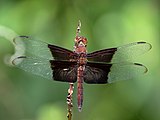Camacinia othello
| Camacinia othello | |
|---|---|

| |
| Male in Cairns, Australia | |

| |
| Female in Cairns, Australia | |
| Scientific classification | |
| Domain: | Eukaryota |
| Kingdom: | Animalia |
| Phylum: | Arthropoda |
| Class: | Insecta |
| Order: | Odonata |
| Infraorder: | Anisoptera |
| Family: | Libellulidae |
| Genus: | Camacinia |
| Species: | C. othello
|
| Binomial name | |
| Camacinia othello | |

| |
Camacinia othello is a species of dragonfly in the family Libellulidae[3] known commonly as the black knight.[4] It is native to Indonesia, Papua New Guinea, the Solomon Islands, and the Northern Territory and Queensland in Australia.[1]
It is a large dragonfly with a wingspan of 115 millimeters and an overall length of around 65 millimeters The adult male has dark markings on the forewing and hindwing covering around one third to one half of each wing. The markings on the female differ substantially, with a light brown stripe along the leading edge of each wing to just beyond the node, and light brown marks on each wingtip.[5]
Little is known about its habitat preferences and other characteristics.[1] There are twenty-seven records listed in the Atlas of Living Australia as of January, 2017.[4] It is not considered to be threatened.[1]
Gallery
[edit]-
Male, dorsal view, Cairns
-
Male underside
-
Male showing brownish body
-
Female wings
-
Male wings
References
[edit]- ^ a b c d Kalkman, V.J. (2020). "Camacinia othello". IUCN Red List of Threatened Species. 2020: e.T163911A83377915. doi:10.2305/IUCN.UK.2020-1.RLTS.T163911A83377915.en. Retrieved 20 November 2021.
- ^ Tillyard, R.J. (1908). "On some remarkable Australian Libellulinae. Part ii". Proceedings of the Linnean Society of New South Wales. 33: 637–649 [639] – via Biodiversity Heritage Library.
- ^ "Species Camacinia othello Tillyard, 1908". Australian Faunal Directory. Australian Biological Resources Study. 2012. Retrieved 27 February 2017.
- ^ a b Camacinia othello. Archived 2016-02-06 at the Wayback Machine Atlas of Living Australia.
- ^ Theischinger, Gunther; Hawking, John (2006). The Complete Field Guide to Dragonflies of Australia. Collingwood Vic.: CSIRO. p. 292. ISBN 0643090738.






